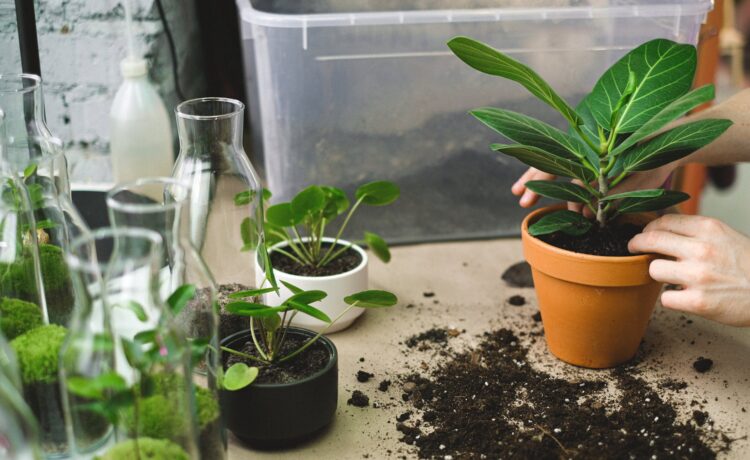A beautiful addition to any home is a houseplant. Understanding their fundamental care requirements is the key to keeping them healthy and alive. Here is a collection of the most important advice for caring for indoor plants to get you started.
The good news is that the majority of indoor plants don’t need complicated upkeep. These tips on plant maintenance are meant to help you understand the basic needs of the majority of indoor plants. We’ll also offer suggestions for the materials you should use to create your own indoor garden. You’ll understand the fundamentals of getting plants to grow and thrive in your house once you’ve gone through these suggestions, enabling you to start your own indoor garden.

The first step in effective plant care is placing the right plant in the appropriate location. It’s important to understand that not every plant will work with your surroundings and lifestyle, and that’s okay. On the market, there are many choices for indoor plants. If you’ve kept that one alive and healthy for a decent period of time and your confidence in horticulture has grown, move on to more. But be careful, keeping houseplants can become compulsive.
Are you interested in hanging plants, desk plants, bromeliads, tropical plants, desk plants, or desk plants? Even though many of the different plant species have similar needs, you should still do a lot of research before making a purchase.
If you intend to put them directly into a pot, such as a grow pot or terra cotta pot, make sure they have drainage holes. There is/are a hole(s) in the bottom of the pot that will allow extra water to drain in order to prevent root rot. Taste, décor, and cost all factor into decorative pots like ceramics, baskets, etc. These days, it could be difficult to choose among the numerous pots that are offered. Having your plants in fashionable pots will enhance their appearance and bring you joy, even though it has little to do with caring for indoor plants.
Exposure to light is crucial. A houseplant can eventually perish from too much or too little light. Some plants need a lot of sunlight, while others prefer indirect light, and yet others may survive in lower light levels. Just be aware that the majority of houseplants will burn in the bright, direct sun. Certain indoor plants will survive at reduced light levels, but you won’t notice much growth. Speaking of light exposure, throughout the winter you might need to shift your plants to areas that receive more light. Moving one or two plants can be required if you live in a region with longer, darker winters.

This is yet another crucial point. If you’ve ever bought houseplants and noticed that they don’t last very long or develop droopy leaves after a few weeks, you may have overwatered them. Finding the right amount of water to use can be challenging when you’re just starting out. Most indoor plants that end up in the compost pile are probably the result of overwatering. As previously noted, it’s wise to buy pots with drainage holes and keep an eye on the soil moisture levels.
3 Fun Facts About House Plants
Did you know that there are over 26,000 species of house plants? Or that some plants can actually help improve your air quality? In this blog post, we’re going to explore three fun facts about house plants that you may not have known. We’ll also give you a few tips on how to care for your house plants so that they can thrive. So whether you’re a plant enthusiast or just looking to add a little greenery to your home, read on for some helpful information.
House plants can improve your mood and mental health
1. House plants can improve your mood and mental health
It’s no secret that house plants can brighten up any room, but did you know that they can also improve your mood and mental health? Studies have shown that keeping house plants in your home can help to reduce stress, anxiety, and depression. One study even found that office workers who had plants in their workspace had lower levels of stress than those who didn’t.
So if you’re looking for a way to boost your mood and mental health, consider adding some house plants to your home. Not only will they make your space look more inviting, but they could also help you feel more relaxed and calm.
House plants can help purify the air in your home
In today’s homes, the air is often more polluted than it is outside. This is because of the many chemicals that are used in building materials, cleaning products, and personal care items. These pollutants can cause health problems, including respiratory problems and headaches.
One way to help purify the air in your home is to use house plants. House plants help by absorbing these pollutants and filtering them out of the air. They also release oxygen into the air, which helps to improve indoor air quality.
There are many different types of house plants that can be used for purifying the air. Some of the most popular include: spider plants, peace lilies, and bamboo palms.
House plants can boost your productivity
If you’re looking for a way to boost your productivity, you may want to consider adding some house plants to your home or office. Studies have shown that having plants in your workspace can help improve your focus and concentration, and even increase your overall productivity.
So if you’re looking for a way to get ahead at work or finally tackle that home project you’ve been putting off, consider adding some greenery to your space. Here are a few of our favorite house plants that are known for their ability to boost productivity:
1. Aloe Vera: Aloe vera is not only great for soothing sunburns, but it can also help improve your focus and concentration. Keep a pot of aloe vera on your desk or near your workstation to help you stay on task throughout the day.
2. Snake Plant: Snake plants are known for their ability to purify the air, making them ideal for offices or homes with poor air quality. These hardy plants can also help increase oxygen levels in the room, which can improve concentration and productivity.
3. Peace Lily: If you’re looking for a plant that’s both beautiful and beneficial, look no further than the peace lily. In addition to being aesthetically pleasing, peace lilies are also great at filtering out harmful toxins from the air. Having one of these lovely plants in your workspace can help improve both the quality of the air and your productivity levels.
How to care for house plants
Just like any pet, house plants need to be cared for in order to stay healthy and thrive. Here are some tips on how to care for your house plants:
– water them regularly, depending on their individual needs (most plants like to be watered about once a week)
– place them in a location where they will receive the appropriate amount of light (some plants need direct sunlight, while others prefer indirect light)
– fertilize them regularly, using a fertilizer that is specific for house plants
– check them periodically for pests and diseases, and treat accordingly
By following these simple tips, you can ensure that your house plants will stay healthy and happy for years to come!





